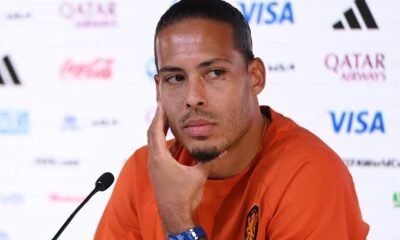News
‘Messi Easier To Mark’ – Ex Liverpool Star

Former Liverpool and Real Madrid defender Alvaro Arbeloa has explained why he was able to shut down Lionel Messi by making him “easier to mark”.
The former Liverpool international did not always get the better of Messi during their on-field battles, but one memorable Champions League outing from 2007 saw him emerge victorious. Said contest saw Arbeloa handed a baptism of fire by Liverpool, following his January transfer to Anfield, with Rafa Benitez asking the hard-working defender to line up against Messi in a last-16 encounter at Camp Nou.
READ ALSO: Messi To Win Another Award? Bellingham & Haaland Nominated
The Argentine icon, who was only 19 at the time, explained to the Coaches’ Voice why he wasn’t as much of a handful back then: “We played that day with me at left-back. Two strikers up front, although (Dirk) Kuyt played a bit further back. (John Arne) Riise usually played at full-back, but that day played ahead of me. That day, I had to mark Messi. I remember it perfectly. Rafa Benitez came to training one day in Liverpool and he told me that I was going to play left-back to mark Messi. Rafa saw clearly that he was a player who tended to go inside, and he thought that I could do well in that position – which was new for me. It was also my debut in the Champions League and before it, we went to Portugal for a mini-training camp where we prepared for the game. The main difference from the Messi I marked that day to a few years later, was that then Messi would almost always receive very, very wide which made it easier for me to mark. Not quite man-to-man, but by dropping a lot in my zone and almost letting him receive on the wing. That made it easier for me to be very close to him, and I also had Riise’s defensive help throughout. I think I remember that it was (Juliano) Belletti, the Barca right-back, who didn’t overlap a lot in that tie. He was quite an attacking player, but he didn’t overlap much so I always had Riise’s help. Maybe the difference in the later version of Messi, who was obviously still as good, was that he started in a freer role and came to receive more in the square (between defenders) or dropped further back to receive. That made it very difficult for an opponent to get as close to him as I was in that game.”
Arbeloa went on to say, with Liverpool progressing to the quarter-finals at Barcelona’s expense: “What Rafa wanted was for me to always let him receive the ball on the flank. He wasn’t too worried about Messi coming out wide, because he came out on his right foot – and that’s what we tried to do in that tie, which went very well. We won 2-1 in Barcelona, and even though they beat us 1-0 in Liverpool, we managed to eliminate a Barcelona team that had been European champions the year before. One of the things that also worked in my favour in this case when I was marking Leo Messi, and something that I insist on a lot with my players, is that Leo always tended to ask for the ball into his feet. I wasn’t worried that he would look to get in behind me. He wasn’t a player who would come and ask for the ball and then break into the space behind. That made it easier for me to stay on top of him, and I didn’t mind jumping whenever he went. If Leo dropped, I could go because there wasn’t that threat in behind and because Riise was also there. Sometimes, even if I pushed up a lot with Leo, he would drop and cover my position. Another of the instructions that Rafa gave us was when to leave him. That’s one of the most important things when you are marking a player. In the second half, Leo tried to get out a lot. The main difficulty when you release is to know if another player is going to pick him up. If I stayed with him but then he goes and goes, I had to communicate with Momo (Sissoko), in this example, so that he could get to him. If Momo has dropped, I never worried about following him because I always had Riise to help. In this case, we were almost a double full-back, and he covered me a lot in this position. So even if it wasn’t a man-marking job, in theory, in reality, it pretty much was.”
Messi’s stock skyrocketed when he defeated Arbeloa and Liverpool, even though he was still two years away from winning the first of his eight Ballon d’Or. He soon grasped how to outplay opponents and exploit his own ability.




























